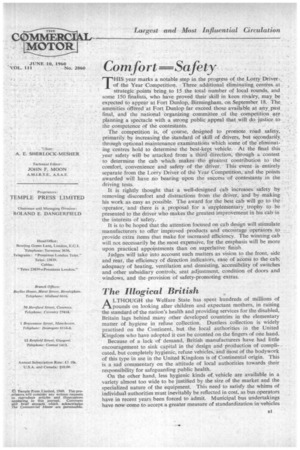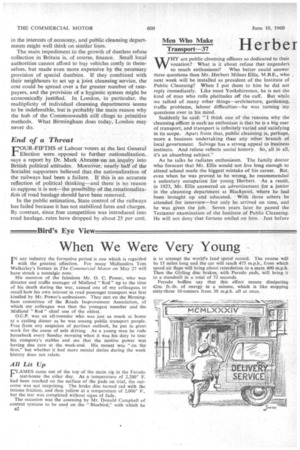Comfort Safety
Page 35

Page 36

If you've noticed an error in this article please click here to report it so we can fix it.
., . THIS year marks a notable step in the progress of the Lorry. Driver-, ' of the Year Competition. Three additional eliminating. centres at strategic•pointi bring to 15 the total number of local rounds, and some 150 finalists, who have proved their skill in keen rivalry, may be " expected to appear at Fort Dunlop, Birmingham, on September 18. The amenities offered at Fort Dunlop far exceed those available at any_past . . final, and the national 'organizing committee of the competition . are planning a spectacle with a strong public appeal that will do justice to . the competence of the contestants. .
The competition is, of course, designed to promote road safety, primarily by increasing the standard of skill of drivers, but secondarily through optional maintenance examinations which some of• the eliminating centres hold to determine the best-kept vehicle. At the final this , year safety will be attacked from -a third direction", through a ' contest to determine the cab -which makes the greatest contribution to the comfort, convenience and safety of the . driver. . This event is entirely separate from the Lorry Driverof the Year Competition, and the points awarded will have no bearing upon the success of contestants in the . driving tests. . . It is rightly thought that a well designed cab increases: safety by removing discomfort and distractions from the driver, and by -making his work as easy as possible. The award for the best. cab Will go, to the . operator, and there is a proposal . for a supplementary ,. trophyto be , presented to the driver who makes the greatest improvement in his -dab in the interests Of safety.
It is to be hoped that the attention focused on cab design will stimulate manufacturers to offer improved products and encourage -operators .to provide extra items that make for increased efficiency. The winning cab will not necessarily be the most expensive, for the emphasis will be more upon practical appointments than on superlative finish.
Judges will take into account such matters as vision to the front, side and rear, the efficiency of direction indicators, ease of 'aCeess to the cab; adequacy of heating, ventilation and demisting, 'accessibility of switches and other subsidiary controls, seat adjustment, condition of doors and windows, and the ,provision of safety-promoting extras.
The Illogical British
A LTHOUGH the Welfare State has spent hundreds of millions of ..pounds on looking after children and expectant mothers, in raising the standard of the nation's health and providing services for the disabled, Britain lags behind many other developed countries in the elementary matter of hygiene in refuse collection. Dustless collection is widely practised on the Continent, but the local authorities in the United Kingdom who have adopted it can be counted on the fingers of one hand.
Because of a lack of demand, British manufacturers have had little encouragement to sink capital in the design and production of complicated, but completely hygienic, refuse vehicles, and most of the bodywork of this type in use in the United Kingdom is of Continental origin. This is a sad commentary on the attitude of local authorities towards their responsibility for safeguarding public health. On the other hand, less hygienic kinds of. vehicle are available in a variety almost too wide to be justified by the size of the market and the specialized nature of the equipment. This need to satisfy the whims of individual authorities must inevitably be reflected in cost, as bus operators have in recent years been forced to admit. Municipal bus undertakings have now come to accept a greater measure of standardization in-vehicles in the interests of economy, and public cleansing departments might well think on similar lines.
The main impediment to the growth of dustless refuse collection in Britain is, of course, finance. Small local authorities cannot afford to buy vehicles costly in themselves, but made even more expensive by the necessary provision of special dustbins. If they combined with their neighbours to set up a joint cleansing .service, the cost could be spread over a far greater number of ratepayers, and the provision of a hygienic system might be economically justified. In London, in particular, the multiplicity of individual cleansing departments seems to be indefensible, but is probably the main reason why the hub of the Commonwealth still clings to primitive methods. What Birmingham does today, London may never do. _
End of a Threat
-cOUR-FIFTHS of Labour voters at the last General Election were opposed to further nationalization, says a report by Dr. Mark Abrams on an inquiry into British political attitudes. Moreover, nearly half of the Socialist supporters believed that the nationalization of the railways had been a failure. If this is an accurate reflection of political thinking—and there is no reason to suppose it is not—the possibility of the renationalization of road haulage should have been removed.
In the public estimation, State control of the railways has failed because it has not stabilized fares and charges. By contrast, since free competition was introduced into road haulage, rates have dropped by about 25 per cent.




















































































































































